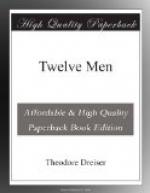At the same time, and odd as it may seem, he was seemingly in intimate contact with a circle of friends that rather astonished me by its catholicity. It included, for instance, and quite naively, real estate dealers, clerks, a bank cashier or two, some man who had a leather shop or cigar factory in the downtown section, a drummer, a printer, two or three newspaper artists and reporters—a list too long to catalogue here and seemingly not interesting, at least not inspiring to look at or live in contact with. Yet his relations with all of these were of a warm, genial, helpful, homely character, quite intimate. He used them as one might a mulch in which to grow things, or in other words he took them on their own ground; a thing which I could never quite understand, being more or less aloof myself and yet wishing always to be able so to do, to take life, as he did.
For he desired, and secured, their good will and drew them to him. He took a simple, natural pleasure in the kinds of things they were able to do, as well as the kinds of things he could do. With these, then, and a type of girl who might not be classed above the clerk or manicure class, he and they managed to eke out a social life, the outstanding phases of which were dances, “parties,” dinners at one simple home and another, flirting, boating, and fishing expeditions in season, evenings out at restaurants or the theater, and I know not what else. He could sing (a very fair baritone), play the piano, cornet, flute, banjo, mandolin and guitar, but always insisted that his favorite instruments were the jews’-harp, the French harp (mouth organ) and a comb with a piece of paper over it, against which he would blow with fierce energy, making the most outrageous sounds, until stopped. At any “party” he was always talking, jumping about, dancing, cooking something—fudge, taffy, a rarebit, and insisting in the most mock-serious manner that all the details be left strictly to him. “Now just cut out of this, all of you, and leave this to your Uncle Dudley. Who’s doing this? All I want is sugar, chocolate, a pot, a big spoon, and I’ll show you the best fudge you ever ate.” Then he would don an apron or towel and go to work in a manner which would rob any gathering of a sense of stiffness and induce a naturalness most intriguing, calculated to enhance the general pleasure an hundredfold.




